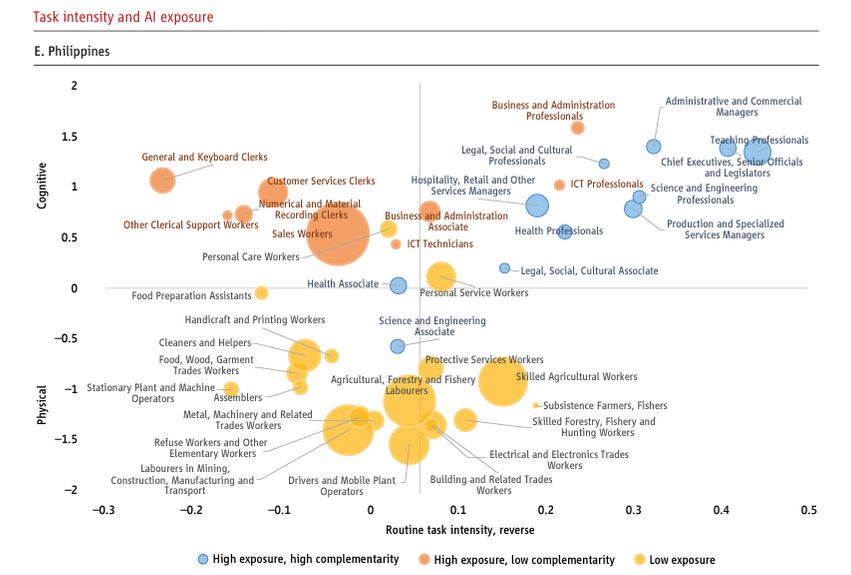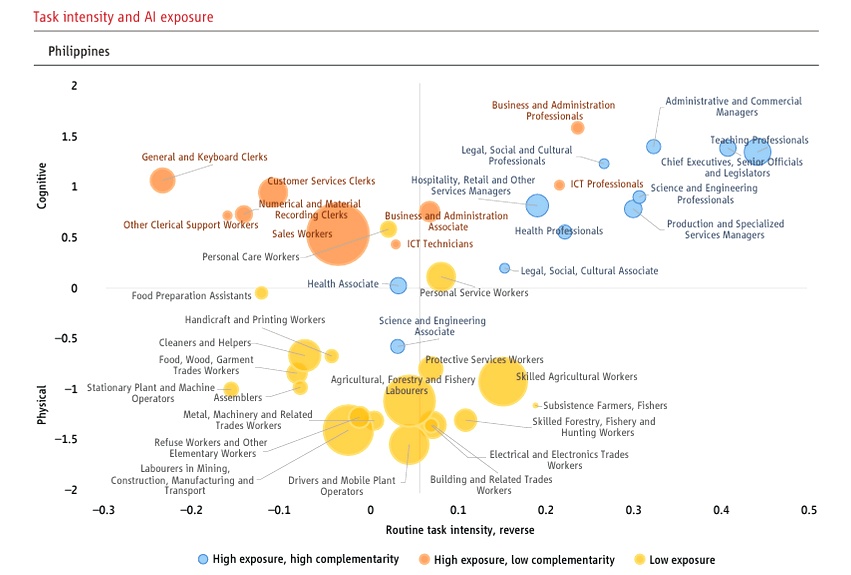Phl faces labor challenges amid technological change, AI adoption

The Philippines, along with other countries in the East Asia and Pacific region, is set to experience rapid economic growth, projected at 4.8% in 2024.
However, as the nation advances, the shift toward automation, artificial intelligence (AI), and digital platforms is reshaping the workforce, creating new opportunities while also presenting significant challenges.
As global technological advancements transform industries, the country faces the dual task of boosting productivity while addressing potential job displacement, particularly in sectors dependent on routine manual labor.
A World Bank study, “Jobs and Technology,” highlights how the nation’s growth, driven by strong private consumption and the recovery of service exports, contrasts with the growing need to adapt its workforce to the evolving technological landscape.
Impact of AI and automation on labor markets
In the Philippines, as in other developing nations in the region, the adoption of AI and robots is already affecting low-skilled workers in formal sectors. Between 2018 and 2022, automation displaced an estimated 1.4 million low-skilled workers, primarily engaged in routine manual tasks, across Indonesia, Malaysia, the Philippines, Thailand, and Vietnam, according to a World Bank study.
At the same time, automation has driven productivity gains, creating new opportunities for skilled workers, particularly those in non-routine manual and cognitive roles. In the Philippines, digital technologies have contributed to a 21% wage increase for workers in digitally intensive occupations, with women disproportionately benefiting from these wage premiums.
However, the shift to automation also risks widening inequalities. While skilled workers may benefit, low-skilled workers face the threat of job displacement or being absorbed into the informal sector. With a large proportion of workers in routine manual roles, the Philippines is especially vulnerable to this type of displacement.
AI exposure and task intensity
In contrast to advanced economies, the Philippines has a relatively smaller share of workers in cognitive task occupations, making it more vulnerable to displacement by AI, which is increasingly affecting non-routine cognitive tasks.
While the region as a whole faces greater exposure to AI than to robots, the Philippines is no exception. The growth of AI-powered digital platforms is shifting tasks from formal to informal work, with some workers experiencing higher earnings in the digital economy, particularly in services such as ride-hailing and online selling.
The rise of these platforms, which operate at a large scale, has boosted firm productivity in sectors like services and retail. However, they also pose a risk of turning formal workers into informal ones, reducing job security. For example, in Indonesia, digital workers in the informal sector earn nearly as much as their counterparts in the formal sector, narrowing the income gap between the two sectors.
Preparing for AI and automotion
The emergence of automation and AI highlights the need to focus on retraining the workforce to adapt to new technologies. The World Bank has urged Philippine policymakers to prioritize upskilling, with an emphasis on digital literacy, technical training, and soft skills, to prepare workers for jobs that complement rather than compete with automation. This approach will be crucial in helping workers transition into roles that require cognitive skills and creativity, which are less likely to be automated, the global lender added.
Beyond technical skills, improving worker mobility and removing barriers to labor market access are essential for maximizing the benefits of automation. Policies should aim to ease transitions between sectors, occupations, and regions, while ensuring that digital platforms do not replace formal job protections and benefits, the World Bank advised.
Building a resilient digital workforce
As the Philippines faces these challenges, the focus must shift to building a more flexible and inclusive workforce that can thrive in a digital economy.
Digital technologies have the potential to boost productivity and create new job opportunities. However, without targeted policies to address the risks of displacement, these benefits may not be evenly distributed.
Equipping workers with the skills necessary for an AI-driven economy and fostering greater labor mobility will be crucial to ensuring that the advantages of technological change are widely shared.



0 Comment